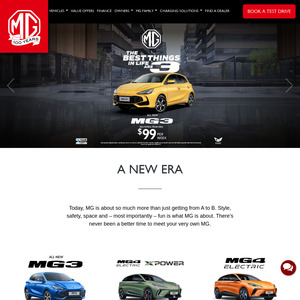MG has today announced that they are bringing the 51kWh Excite version of its MG4 model to New Zealand, and confirmed the launch pricing.
$46,990 +ORC, less the $7015 EV rebate.
This is notable because it becomes the cheapest new pure EV available in NZ. $3000 cheaper than the previous cheapest, the $49,990 MG ZS EV & GWM Ora.
And it has impressive specs to boot. The car is about the size of a corolla hatchback. Notable specs for the 51kWh:
- RWD
- 125kW
- 7.7s 0-100km/h time
- 50:50 weight distribution
- 350km WLTP range
- LFP battery chemistry
- LED head and tail lights
- Vehicle to load (2.2kW)
- 448kg payload
- 500kg tow rating
- 10.6m turning Circle
- 117kW max DC charging speed (37min from 10% to 80% on a 150kW+ charger)
- 7 year, unlimited km warranty (non commercial)
(some of the specs are from the euro version of the same car as MG is yet to release a full spec sheet on their website).
I suggest that this offering is going to shake up the lower end of the New EV market substantially. Offerings like the entry GWM Ora, entry BYD Dolphin, entry Nissan leaf, and entry Hyundai Ioniq are both more expensive and offer weaker specifications than the MG4 51kWh Excite. This MG4 is an epic deal in comparison.
Deliveries are expected in the third quarter of 2023.


Are mg known for thier reliability? Was under possibly an old impression they are not to reliable compared to the asian market cars?
Honestly interested in a hybrid or electric car atm but so hard to choose!
Also this seems like a fantastic deal, costs 25k plus for this model in the uk!
Hotukdeals comments here: https://www.hotukdeals.com/deals/mg-mg4-51kwh-se-auto-5dr-ps…